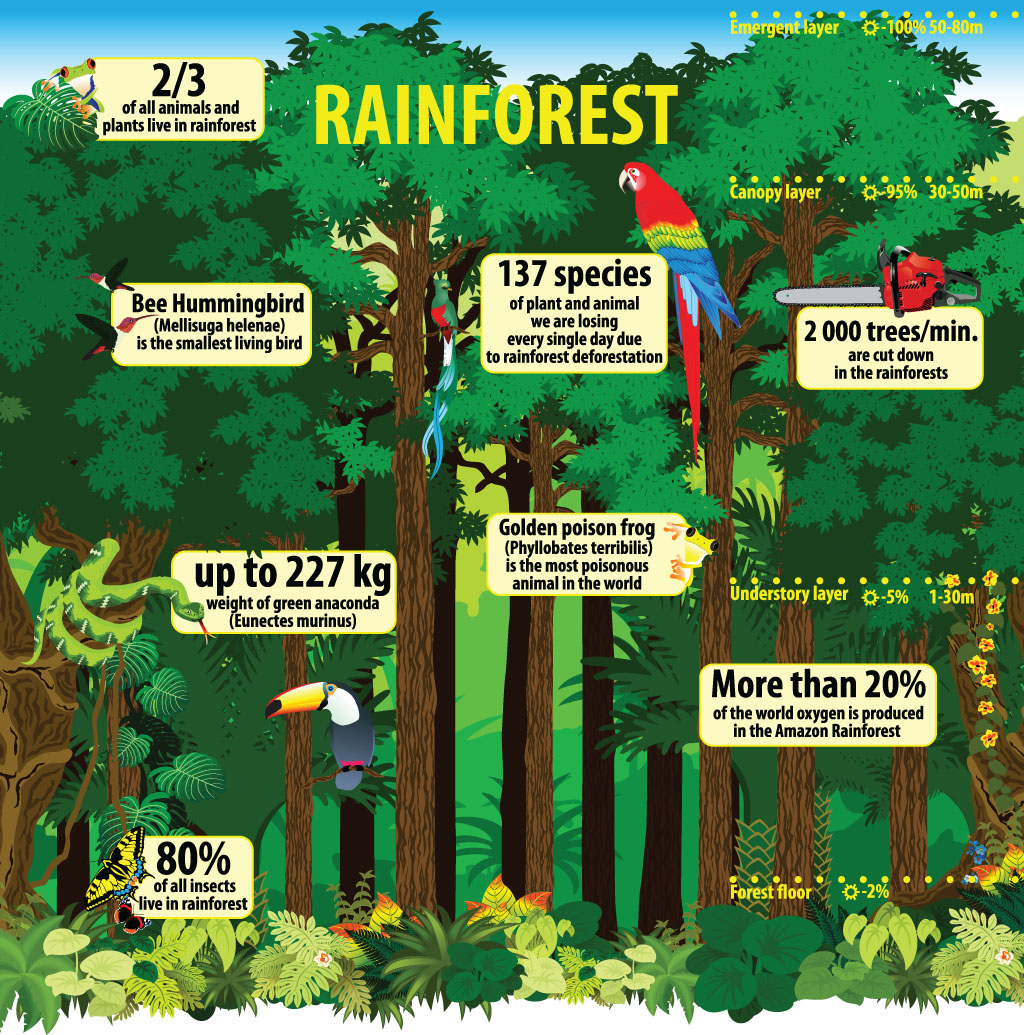Tropical rainforest plants adaptations to environment images are available in this site. Tropical rainforest plants adaptations to environment are a topic that is being searched for and liked by netizens today. You can Find and Download the Tropical rainforest plants adaptations to environment files here. Find and Download all royalty-free images.
If you’re looking for tropical rainforest plants adaptations to environment pictures information related to the tropical rainforest plants adaptations to environment keyword, you have pay a visit to the ideal blog. Our site always provides you with suggestions for downloading the highest quality video and picture content, please kindly surf and locate more informative video content and images that fit your interests.
Tropical Rainforest Plants Adaptations To Environment. Bananas can grow up to 25 feet high in their native habitat. This results is a soil that is poor but plants have shallow roots to help capture nutrients from the top level of soil. Tropical rainforests contain far more species of plants and animals than any other biome. In tropical rainforests, many plants live as epiphytes to receive the necessary sunlight and moisture to complete their life cycle.

 4th Grade Rainforest Ecosystem Shoebox Diorama Tropical From pinterest.com
4th Grade Rainforest Ecosystem Shoebox Diorama Tropical From pinterest.com
These plants are attached to their hosts high in the canopy so that they can compete with other plants for water tapped from rain, fog, dew, or mist. Camouflage, mimicry, having a limited diet, poison, reduction of size and stature, and changing of habitats with illustrations. Many rain forest animals use adaptations to carve out their own niches and protect. In tropical rainforests, many plants live as epiphytes to receive the necessary sunlight and moisture to complete their life cycle. In colder climates north of the equator, tropical plants can be grown as houseplants and set outside during the warm, sunny months. Many plants in the rainforests have adapted leaf shapes that help water drip off the plant to avoid too much moisture, which might make bacteria and fungus grow.
In colder climates north of the equator, tropical plants can be grown as houseplants and set outside during the warm, sunny months.
They are home to many resources, but deforestation could result in negative impacts to the planet. Also, some leaves have flexible stems so they can turn toward the sun, another adaptation is the leaves of the. They increase the amount of sunlight a plant can capture. The glucose gives the plants energy to grow. In tropical rainforests, many plants live as epiphytes to receive the necessary sunlight and moisture to complete their life cycle. The competition means organisms must adapt or develop specialized traits to compete for environmental resources.

 Source: pinterest.com
Source: pinterest.com
They cannot survive in very dry weather and thrive in climates with high humidity and rainfall. An epiphyte is an organism that grows on the surface of a plant. The sunlight is a huge part of photosynthesis, which keeps the plants live. Leaves with burgundy or purple colors are common; Banana trees are cultivated as a popular fruit source.
 Source: pinterest.com
Source: pinterest.com
These plants are attached to their hosts high in the canopy so that they can compete with other plants for water tapped from rain, fog, dew, or mist. The top layer of the rainforest is called the emergent layer. The tropical rainforest contains the most species of plant and animal life, therefore there is immense competition for food and sunlight. They increase the amount of sunlight a plant can capture. Plants and animals living in the tropical rainforest must be able to adapt to the year round humidity and constant warm, humid and wet weather.
 Source: pinterest.com
Source: pinterest.com
The tropical rainforest contains the most species of plant and animal life, therefore there is immense competition for food and sunlight. In colder climates north of the equator, tropical plants can be grown as houseplants and set outside during the warm, sunny months. These plants are attached to their hosts high in the canopy so that they can compete with other plants for water tapped from rain, fog, dew, or mist. This page contains information on rainforest plants, and includes examples of many amazing species. This results is a soil that is poor but plants have shallow roots to help capture nutrients from the top level of soil.
 Source: pinterest.com
Source: pinterest.com
Because cacao trees grow well in the shade, the rainforest does not need to be cut down in order to grow cocoa. Although there is no cold season during which plants experience. They cannot survive in very dry weather and thrive in climates with high humidity and rainfall. The following plant adaptationsenable tropical plants to live in the hot, humid, and wet conditions of the tropical rainforest. In colder climates north of the equator, tropical plants can be grown as houseplants and set outside during the warm, sunny months.
 Source: pinterest.com
Source: pinterest.com
Plant adaptations in the tropical rainforest. Other plants, like orchids, bromeliads and ferns, grow as epiphytes high up in the canopy where there is more sunlight. So the plants here have drip tips and waxy surfaces on leaves to shed the excess water. Most plants in the tropical rainforest have adapted to the strong sunlight, heavy rain, thin soils and dark conditions in the undergrowth. A rain forest is an environment that gets a lot of rain.
 Source: pinterest.com
Source: pinterest.com
The equatorial latitude of tropical rainforests and tropical deciduous forests keeps day length and mean temperature fairly constant throughout the year. A rain forest is an environment that gets a lot of rain. So the plants here have drip tips and waxy surfaces on leaves to shed the excess water. Other plants, like orchids, bromeliads and ferns, grow as epiphytes high up in the canopy where there is more sunlight. Plants and animals living in the tropical rainforest must be able to adapt to the year round humidity and constant warm, humid and wet weather.
 Source: pinterest.com
Source: pinterest.com
A rain forest is an environment that gets a lot of rain. They cannot survive in very dry weather and thrive in climates with high humidity and rainfall. The tropical rainforest environment is characterized by high temperatures and an abundance of rainfall, leading to high levels of humidity. Bananas can grow up to 25 feet high in their native habitat. Because cacao trees grow well in the shade, the rainforest does not need to be cut down in order to grow cocoa.
 Source: pinterest.com
Source: pinterest.com
The following adaptations allow plants to survive in the conditions of the rainforest. There are many types of plants in the tropical rainforest, which is a hot, humid biome that gets over 200 inches of rain a year, creating the perfect conditions for biodiversity. Plants adaptation to rain forest: The tropical rainforest is very thick, and not much sunlight is able to penetrate to the forest floor. The tropical rainforest contains the most species of plant and animal life, therefore there is immense competition for food and sunlight.
 Source: pinterest.com
Source: pinterest.com
The tropical rainforest contains the most species of plant and animal life, therefore there is immense competition for food and sunlight. Leaves with burgundy or purple colors are common; Tropical rainforest plants are plants that grows naturally in a tropical climate. Camouflage, mimicry, having a limited diet, poison, reduction of size and stature, and changing of habitats with illustrations. Although there is no cold season during which plants experience.
 Source: pinterest.com
Source: pinterest.com
Leaves with burgundy or purple colors are common; Tropical rainforest flora have to adapt to an environment that is always hot and wet. The equatorial latitude of tropical rainforests and tropical deciduous forests keeps day length and mean temperature fairly constant throughout the year. This page contains information on rainforest plants, and includes examples of many amazing species. Some adaptations of plants are following:
 Source:
Source:
An epiphyte is an organism that grows on the surface of a plant. Many plants in the rainforests have adapted leaf shapes that help water drip off the plant to avoid too much moisture, which might make bacteria and fungus grow. They cannot survive in very dry weather and thrive in climates with high humidity and rainfall. So the plants here have drip tips and waxy surfaces on leaves to shed the excess water. This article is part of our rainforest series.

This site is an open community for users to submit their favorite wallpapers on the internet, all images or pictures in this website are for personal wallpaper use only, it is stricly prohibited to use this wallpaper for commercial purposes, if you are the author and find this image is shared without your permission, please kindly raise a DMCA report to Us.
If you find this site good, please support us by sharing this posts to your preference social media accounts like Facebook, Instagram and so on or you can also save this blog page with the title tropical rainforest plants adaptations to environment by using Ctrl + D for devices a laptop with a Windows operating system or Command + D for laptops with an Apple operating system. If you use a smartphone, you can also use the drawer menu of the browser you are using. Whether it’s a Windows, Mac, iOS or Android operating system, you will still be able to bookmark this website.





